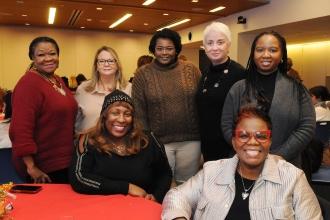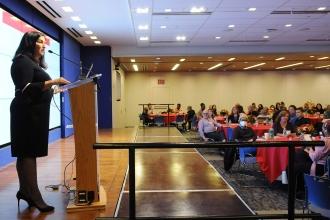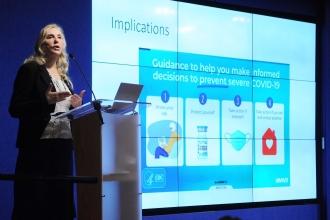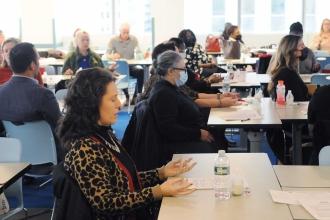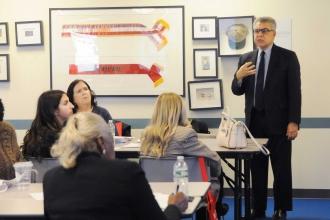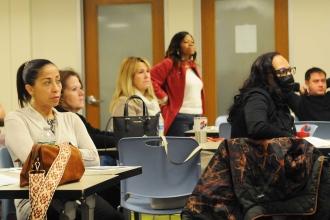Federation of Nurses/UFT Professional Issues Conference
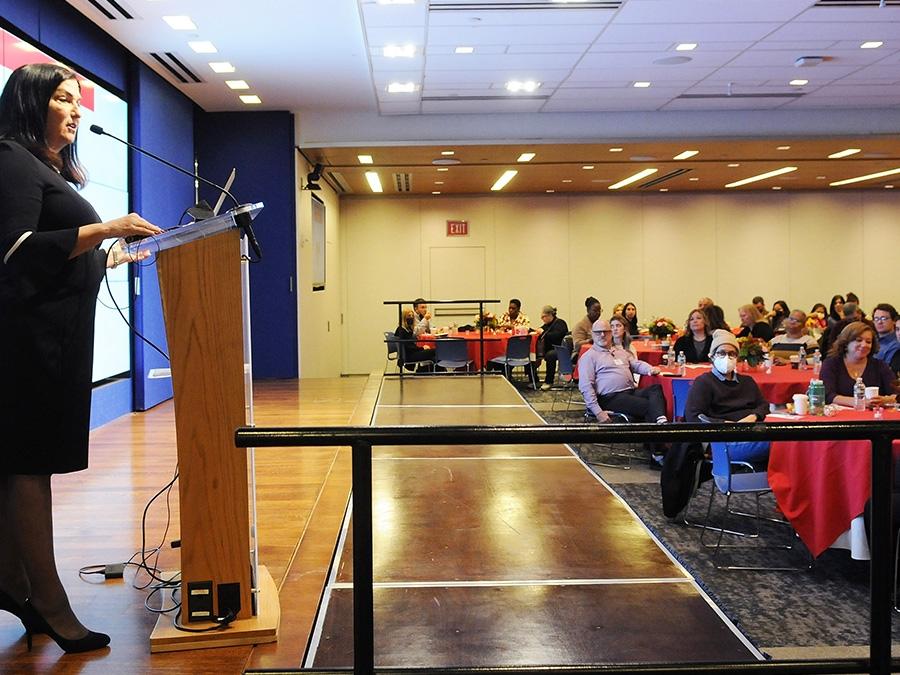
UFT Vice President Anne Goldman, who heads the Federation of Nurses/UFT, tells conference attendees that because of staff shortages, “We’re all challenged to do our best.”
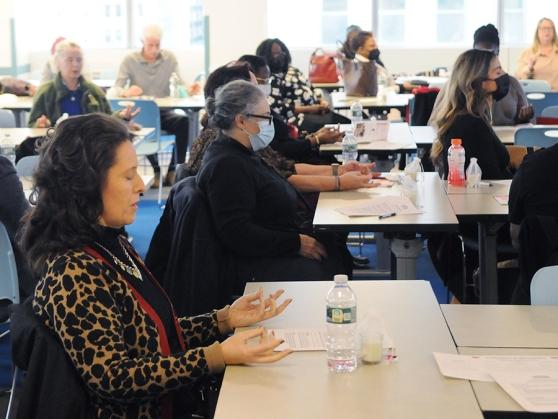
Nurses recite a mantra meant to relax them during a workshop on compassion fatigue and burnout.
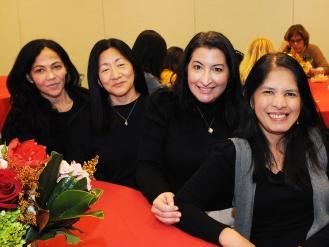
Nurses from NYU Langone Hospital–Brooklyn were in the spotlight after grievances they brought over inadequate staffing produced a $138,000 award divided among more than 250 of them.
From dealing with chronic issues such as burnout to issues specific to the pandemic, nurses represented by the UFT persevere and put their patients first, sometimes even at the expense of their own well-being.
On Nov. 18 at union headquarters in Manhattan, about 150 Federation of Nurses/UFT members gathered for their annual Professional Issues Conference to delve into some of their key concerns and honor colleagues who have helped improve nurses’ working conditions.
Maureen Cann, a 22-year veteran of NYU Langone Hospital–Brooklyn, said she was proud to be part of her union’s signature event. “The voice the union has is the voice of the patients,” she said. “There are a great many of them who don’t have family or friends to speak for them, so we’re the ones to do it.”
That job is harder when the nurses are short-staffed.
Rosemary Scheriff, a union representative at NYU Langone–Brooklyn, was named Hospital Nurse of the Year for filing nearly 1,000 grievances over inadequate staffing during the early months of the pandemic, leading to a recent groundbreaking arbitration ruling that resulted in a $138,000 award divided among more than 250 nurses at the hospital who worked excessive hours.
Key decisions are too often made by “bureaucrats who base their decisions not on patient care or nursing but on PowerPoints,” said UFT Vice President Anne Goldman, who heads the Federation of Nurses/UFT, in her opening remarks.
“Patients would be much better off if the nurses made the decisions and ran the hospitals,” UFT President Michael Mulgrew said in his address. “They understand that the institutions have to be economically viable, but they don’t care about the bonuses” that he said shape the priorities of too many top hospital executives.
During the pandemic, “you were an example for the entire country,” keynote speaker Audrey Stevenson told the crowd in Shanker Hall. “The rest of us were learning so much from your efforts.”
Stevenson, a family nurse practitioner and a strong proponent of vaccines who served as a top health official in Salt Lake City, Utah, said it’s a myth that the danger from COVID-19 is over: “We still have to take precautions in the workplace,” she said. The irritations from wearing masks indoors, she contended, are minor when weighed against the determination not to infect other people.
Personal protective equipment (PPE), including masks, led to one Federation of Nurses/UFT member being hailed as a hero at the conference. The Municipal Credit Union’s Nurse Hero Award was presented to Ruth Caballero of Manhattan Visiting Nurse Service Health. One of the first nurses to visit coronavirus patients in their homes in early 2020, Caballero objected to an order to share her personal protective equipment with co-workers and took the issue to Goldman, who ensured all VNS Health nurses got their own PPE.
The conference also featured workshops on wound care; sepsis; strategies for working with suicidal patients; and compassion fatigue and burnout.
At the workshop on the latter topic, Jodi Heywood, one of the two nursing professional presenters, recalled rearranging her priorities after her son came home bleeding and crying and she was hesitant to end a work phone call to take care of him.
Her candor prompted nurses in the audience to share their own stories of work-related stress.
One moving account came from a nurse who last year lost her 23-year-old daughter to a rare form of cancer. “All that time caring for my patients, and now I had to take care of my daughter. The chemotherapy destroyed her,” the nurse recalled, growing increasingly emotional. “I feel as though I lost myself. There’s a hole, and I just want to get that compassion back, to heal myself and to continue on.”
Maria Scuderio, the co-presenter, said patients’ neediness can wear down nurses and urged attendees to find ways to ease their own stress. “The same kindness you extend to your patients you need to extend to yourself,” she said.
Conference attendees said they were exhilarated by what they learned in the workshops and by the sense of community the event gave them.
Sheryl Jarvis, a VNS Health community nurse, said she’d “learned a lot” and will “definitely be back next year.”
